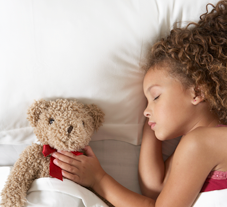
Children spend at least 30 percent of their time sleeping, but many do not get the quality sleep their growing bodies need. Sleep issues in children are common and often go undiagnosed. Kids experience many of the same sleep disorders experienced by adults, such as:
- Sleep apnea (snoring and pauses in breathing during sleep)
- Trouble falling or staying asleep
- Daytime sleepiness
- Difficulty waking up in the morning
- Nightmares, sleep terrors or sleepwalking
- Restless leg syndrome (leg pains disturbing sleep)
These questions can help you determine if your child has a sleep problem:
- Does your child have difficulty falling or staying asleep?
- Does your child have difficulty waking up in the morning?
- Is your child sleepy during the day?
- Does your child have difficulty concentrating at school?
- Is your child experiencing more hyperactive behavior than normal?
- Does your child snore? Does your child seem to have difficulty with breathing at night?
If you answered "yes" to any of the questions, it is best to first talk to your child's pediatrician. If a sleep test is recommended, our Hendricks Regional Health Sleep Disorders Center is here to provide your family a comfortable experience. We provide sleep testing for children as young as seven and work closely with parents through each step of the process. That's because all of our pediatric services our designed with a family-centered approach that puts the unique needs of every child first.
During the test, a specially trained sleep technologist will monitor your child's breathing, oxygen levels, heartbeat, brain activity, body movements and snoring. The information gathered during the sleep test gives doctors important information about your child's health so a treatment plan can be created. All tests are painless and staff will make sure your child feels comfortable and secure.
How to Prepare Your Child for a Sleep Test
Here are some helpful tips to get your family ready for a sleep test at the Hendricks Regional Health Sleep Disorders Center:
- Children under the age of 13 will be required to have a parent stay the night. Older children may spend the night by themselves at the discretion of the parent or sleep staff.
- Try to keep your child from napping or having caffeinated drinks on the day of the sleep test.
- Be sure your child's hair is clean, dry and free of any styling products.
- Bring items from home that make your child feel comfortable, such as a favorite blanket, pillow or stuffed animal.
Call to Schedule
If you have symptoms of a sleep problem, talk with your doctor or call (317) 745-3680 for more information or to make an appointment with a Sleep Specialist.
Forms & Instructions
Resources
Sleep is an essential part of your growing child's health. The amount of sleep needed changes as the child grows older. Learn more about how to establish and maintain healthy sleep habits for your child.